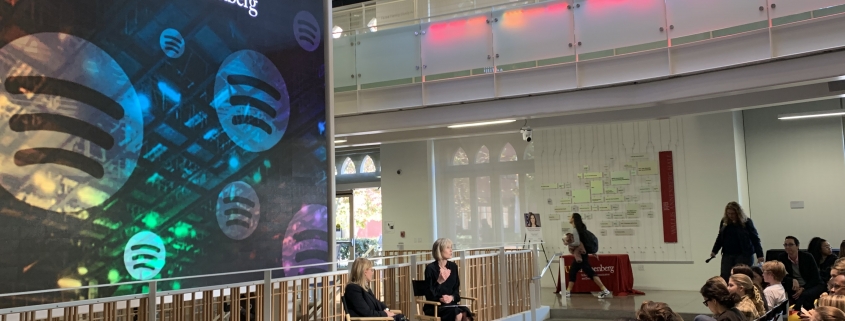Spotify official speaks on female inclusion

Spotify Chief Content Officer Dawn Ostroff discussed the company’s expansion into podcasts, female inclusion in the industry and the Spotify business model at the Wallis Annenberg Hall forum Thursday. The event was part of Annenberg Career Center’s Lunch with a Leader series.
Ostroff, whose entertainment industry experience includes founding Condé Nast Entertainment and serving as president of entertainment for The CW, said she decided to join the streaming company after realizing the impact audio — particularly podcasts — was going to have in the current age and the challenges she would face as part of a platform that was available globally.
“I personally feel they single-handedly changed the music business by having Spotify,” Ostroff said. “I felt that streaming platform is so dynamic — although it’s music right now, I knew [it] was going to expand into podcasts. The medium of audio is exploding, especially among young people.”
Ostroff asked students in the audience whether they listened to AM radio or if they had listened to at least one podcast in the past month, trying to prove what statistics had already shown: the emergence of podcasts as a medium to connect with audiences.
“This room reflects the statistics that we’re seeing,” Ostroff said. “Just to give you an idea, 67% of the people in the U.S. are now getting their audios and 42% of the 18- to 34-year-olds in our country are listening to a podcast once a day or once a week, and that number is growing very quickly. So, you’re seeing a huge spike in this new medium.”
Ostroff also mentioned that Spotify will sponsor the Annenberg Inclusion Initiative study on women in music. She discussed the importance of equal representation in the industry and the way Spotify has been working toward inclusion.
“Our own music team at Spotify now has not only gender equality but we have 51% women, which is a great accomplishment by our entire team,” Ostroff said. “Women need to be more fairly represented in many areas, so I do think that there is a lot of opportunity to still be had.”
Ostroff also answered an audience question on Spotify’s business model and whether creators were paid well through the self-placed advertisements and the company’s payment for original content.
“We are in the business in order to allow a million creators to earn a living off of their art by connecting them with a billion users, right? That’s the core of the entire company,” Ostroff said. “We pay money to the creators to make those podcasts, and we sell the ads, so it’s always about how do we support the community and help the creators.”
Ostroff also explained that Spotify’s business model allows users to choose between free access to all content with advertisements and paying a monthly subscription to hear ad-free content.
“I think that makes it accessible for everybody. Would we increase the fees of our offering? It’s possible,” Ostroff said. “I think that it’s a country by country, region by region basis because you know … every country is going through different times in their cycle, and we also have different maturity levels in different countries.”
Steven Gong, a sophomore majoring in communication, said he enjoyed attending the event because of all the different questions and topics the audience raised.
“I thought it was really interesting. The conversation seemed pretty organic and nonscripted,” Gong said. “I thought it was cool that they opened it up for questions because I thought a lot of the students had interesting questions.”

